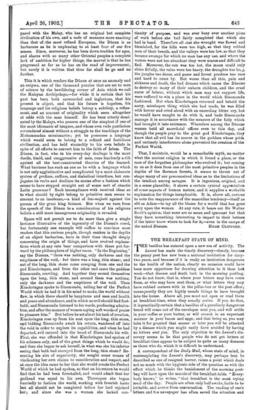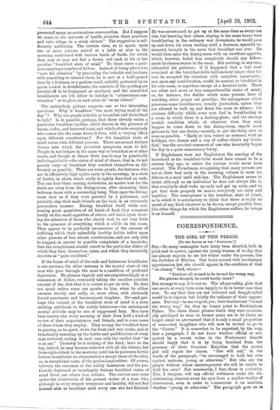THE BREAKFAST STATE OF MIND. T HE bacillus has entered upon
a new era of activity. The Lancet has made the timely discovery—timely, because the penny post has now been a national institution for sixty- two years, and because if it is really an institution dangerous to the health of the nation, clearly no occasion could have been more opportune for drawing attention to it than last week—that disease and death lurk in the morning postbag. You do not know, that is, where your letters may have come from, or who may have sent them, or what letters they may have rubbed corners with in the pillar-box or the post office; consequently they are highly unsafe things to have brought into the house. Above all, you must not open or read them at breakfast-time, when they usually arrive. If you do that, it is practically certain that a bacillus of a peculiarly dangerous breed will come out of the envelopes sent you, and will settle in your coffee or your butter, or will crouch in an expectant manner in your bacon and eggs; and that being so, you may take it for granted that sooner or later you will be attacked by a disease which you might easily have avoided by having no letters sent you. The only objection to the Lancet's dis- covery seems to be that people who do not get letters at breakfast-time appear to be subject to quite as many diseases as those who do, which it is difficult to understand.
A correspondent of the Daily Mail, whose state of mind, in contemplating the Lancet's discovery, may perhaps best be described as one of resigned horror, raises a point which deals not so much with the hygienic side of the question as with the effect which he thinks the banishment of the morning post- bag will have upon the morale of the breakfast-table. " Every- body knows," he writes, "that breakfast is the most trying meal of the day. People are often only half awake, liable to be irritable, and averse from conversation. The reading of one's letters and the newspaper has often saved the situation and
prevented many an acrimonious conversation. But I suppose we must, in the interests of health, abandon these practices and take refuge in a stony silence." The suggestion is suf- ficiently saddening. The curtain rises, so to speak, upon two or more persons seated at a table at nine in the morning, confronted with various kinds of foods, for which they may or may not feel a desire, and each in his or her peculiar. "breakfast state of mind." To these enter a post- man carrying a number of letters. Instead of being allowed to "save the situation" by presenting the irritable and taciturn with something to interest them, he is met at a half-opened door by a footman or a parlour-maid, suitably protected by an apron soaked in disinfectants, the contents of the postbag are hurried off to be fumigated or sterilised, and the assembled breakfasters are left either to indulge in "acrimonious con- versation" or to glare at each other in "stony silence."
The melancholy picture suggests one or two interesting questions. Why is breakfast "the most trying meal of the day" ? Why are people irritable at breakfast and disinclined to talk ? Is it possible, perhaps, that there already exists a particular breakfast bacillus, which thrives in the presence of bacon, coffee, and buttered toast, and which attacks everybody who comes into the room where it lives, with a varying effect upon different constitutions ? For the breakfast state of mind varies with different persons. There are several distinct classes into which the prevalent symptoms seem to falL People do not behave in the same way at breakfast as at other meals, and though at dinner their moods may be practically indistinguishable—the states of mind of diners, that is, do not greatly vary—at breakfast they conduct themselves as dif- ferently as possible. There are some people, for instance, who are in offensively high spirits early in the morning; in a state of health, in short, which really is rightly described as rude. You can hear them coming downstairs, no matter how far the stairs are away from the dining-room, after slamming their bedroom doors with a resounding bang. They open the dining. room door as if they were pursued by a policeman, and probably slap their male friends on the back in an extremely provocative manner. During breakfast itself, while con- suming great quantities of all kinds of food, they comment loudly on the small appetites of others, and insist upon draw- ing the attention of those who clearly wish to eat very little to the presence of everything which is edible in the room. They appear to be perfectly unconscious of the amount of suffering which their splendidly healthy habits inflict upon other persons of less robust constitutions, and are only able to suggest, in answer to possible complaints of a headache, that the complainant should resort to the particular dishes of which they have themselves eaten, and which they invariably describe as "quite excellent."
If the frame of mind of the rude and boisterous breakfaster is one extreme, the other extreme is the mental state of the man who goes through the meal in a condition of profound depression. He glances vaguely and uncomprehendingly at a succession of dishes, eventually taking the smallest possible amount of the dish that it is easiest to get on with. He does not speak unless some one speaks to him, when he either answers shortly and sadly, or, more often, with obviously forced merriment and inconsequent laughter. Or—and per- haps this variant of the breakfast state of mind is a more striking antithesis to the rudely boisterous—his unbalanced mental attitude may be one of suppressed fury. Men have been known who every morning of their lives hold a kind of review of their acquaintances and friends, and in some cases of those whom they employ. They occupy the breakfast-hour in passing, so to speak, down the front and rear ranks, and in trenchantly summing up the habits and qualifications of every man reviewed, ending in each case with the verdict that "he is an ass." Probably he is nothing of the kind ; later in the day, indeed, he may become endowed with all the virtues, but from eight o'clock in the morning until ten he possesses for the furious breakfaster no characteristics except those of the idiot, or, in exceptional cases, of the professional robber. Of course, between the extremes of the rudely boisterous and the pro- foundly depressed or trenchantly furious breakfast states of mind there are others less definite. The carious case came under the observation of the present writer of a man who, although in every respect temperate and healthy, did not find himself able to breakfast until every one else had finished.
He was accustomed to get up at the same time 88 every one else, but knowing that others staying in the same house were breakfasting in the ordinary way downstairs, he would pace up and down his room waiting until a footman, specially in- structed, brought in the news that breakfast was over. He would then enter the dining-room with an excellent appetite, which, however, failed him completely should any fellow. guest by chance return to the room. But nothing, in any case, exhausted his patience ; if it happened that a late riser remained at the breakfast-table half-an-hour longer than the rest, he accepted the situation with complete equanimity ; nor, upon any consideration, would he consent to breakfast in his own room, or anywhere except at a deserted table. There are other and more or less comprehensible states of mind ; as, for instance, the dislike which some persons have of watching other people eat porridge ; the unhappiness which possesses some breakfasters, usually journalists, unless they are allowed to walk up and down the room in silence; the extreme difficulty which some men find in breakfasting in a room in which there is a looking-glass; and the strange mental condition which, at whatever time they may happen to come down to the dining-room, impels some persons to but one desire,—namely, to get the thing over as soon as possible. "Early or late, winter or summer, work or holidays, two damns and a cup of coffee—that's my break- fast," was the succinct comment of one who invariably began the day in a quite unnecessary hurry.
If Englishmen were not Englishmen the meeting of the household at the breakfast-table would have ceased to be a custom long ago, or rather the custom would never have existed. The Frenchman, recognising that many persons are not at their best early in the morning, refuses to meet his fellows at a meal until mid-day. The Englishman seems to insist, although as an individual he does not always like it, that everybody shall wake up early and get up early, and to get that done properly he makes everybody eat early and together. The consequence is the breakfast state of mind; as to which it is satisfactory to think that there is really no moral of any kind whatever to be drawn, except possibly that, like other things for which the Englishman suffers, he brings it on himself.



























































 Previous page
Previous page